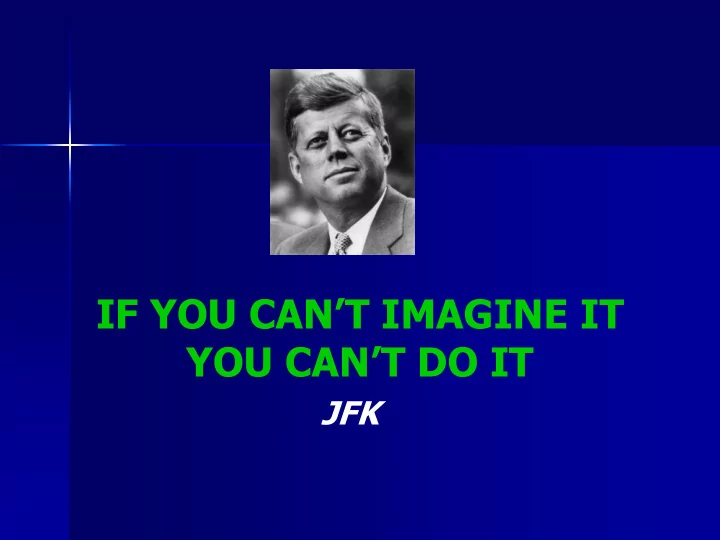

IF YOU CAN’T IMAGINE IT YOU CAN’T DO IT JFK
What do we live for? (Badge) What do we strive for? (Goals) What do we stand for? (Values) This Photo by Unknown Author is licensed under CC BY
What do you want? How much does it cost? Are you prepared to pay the price?
WHAT WILL EXCELLENCE LOOK LIKE TOMORROW? TODAY’S EXCELLENCE IS ALREADY HISTORY
“VICTORY SMILES UPON THOSE WHO ANTICIPATE THE CHANGES IN THE CHARACTER OF WAR, NOT THOSE WHO WAIT TO ADAPT THEMSELVES AFTER CHANGES OCCUR” Giulio Douhet
RISK COURAGE FEAR
BEING COMFORTABLE BEING UNCOMFORTABLE
Mindset Agility to change Advantage edge Right Control the Consistent Decisions Performance controllables under Excellence pressure Error Elimination Leverage the uncertain
Performers Sport-Specific performance (integrated performance & coaching outcome) Optimal Under-performance Periodisation plan & competition sequencing Optimal Poor Psychology Physiology Biomechanics Tactics Medical/lifestyle Technology Sequence of training (macro, meso, micro) Strength Endur. training training Loads Loads General Optimal/Poor Optimal/Poor Optimal/Poor O ptimal/Poor Optimal/Poor General Related Related specific Strength/Mobility Balance specific Competition equipment Monitoring Opt./Poor Opt./Poor Mental analysis Emotional Social Communication Strength Health stability Volume/ distractions Volume/ Non training intensity intensity confidence stress Regeneration & recovery Injury Down Focus & Cognitive Ahead Opt./Poor discipline stress Respond to sickness %muscle/fat fatigue Opposition/adversity Technique(s) Adaptable/creative nutrition Mobility Speed Equipment Agility Finances Work training prevention treatment training training relationships Training School Rehabilitation Colleagues Family Learning Stability treatment Agent Recovery prevention
WHAT COULD WHAT WILL WE BE & DO? WE BE & DO? POSSIBILITIES DECISIONS OPTIONS ACTIONS WHAT IF? WHY NOT? NO EXCUSES NO LIMITS
DISRUPT DREAM DECIDE DESIGN DELIVER
FAILURE SHOULD BE OUR TEACHER, NOT OUR UNDERTAKER. FAILURE IS DELAY, NOT DEFEAT. IT IS A TEMPORARY DETOUR, NOT A DEAD END. FAILURE IS SOMETHING WE AVOID ONLY BY SAYING NOTHING, DOING NOTHING AND BEING NOTHING. DENIS WAITLEY
Change is a never ending story Are you going to write it or just read about it?
Professor Frank Dick OBE twitter.com/frankdickcoach
RESERVE SLIDES
FUTURE COACH 1. Coaches Charter (appended) recognised by Athletes; National Federations; Agents.
Knowledge The Coach has: A right to an accessible and coordinated program of coach education. A responsibility to actively pursue continuous personal and professional coach development and to maintain a level of education compatible with effectively addressing their athletes’ needs.
Qualification The Coach has: A right to an accredited system of coach certification. A responsibility to achieve and maintain that level of certification consistent with their coaching role and professional status.
Agreement The Coach has: A right to a formal contract with athlete or Club or Federation. A responsibility to meet all aspects of their coaching role as set out in that contract and to pass on an athlete or team when personal coaching competencies are not suited to addressing the athlete’s or team’s development and performance needs.
Compensation The Coach has: A right to economic or other consideration for services rendered. A responsibility to effectively apply best endeavours to meet agreed performance and development objectives, ensuring highest standards of product and service offering.
Conditions The Coach has: A right to a working environment supportive of coaching and coaches. A responsibility to contribute to enriching the coaching culture of sport and nation; and to further the profession of coaching.
Representation The Coach has: A right to belong to a professional association. A responsibility to operate at all times within relevant employment law and the IAAF code of ethics for coaches.
Ethical Relationships The Coach has: The right to enjoy parity of esteem whatever their role in the athlete development pathway and this applies equally to coaching able-bodied athletes and those with disability and to be treated fairly and honestly. A responsibility to treat athletes, coaches and officials with respect and integrity.
Voice Coaches have: A right to a voice in the decision-making body of their National Federation, Area Association or International Federation. A responsibility to ensure that the collective view on issues critical to coaches, coaching and the sport is competently represented in the forum of the sport’s relevant Federation, Area or International decision- making body. Such view will reflect a balance between the interest of the athlete, the interest of the sport and the rights and responsibilities of the coach and coaching as enshrined in this charter.
2. A Coaches Professional Body: - to properly regulate Coaching - to work with Coach Education and Certification content designers
2. A Coaches Professional Body: - to set standards in culture of support for Coaches - representation of Coaches and give voice to Coaching
3. Licensing - CPD credits - Practice credits
3. Licensing - Code of Conduct - Protection of Vulnerable Persons - Coaches Charter
4. Education Review for Coaches to be Role Ready - Beginners and School Athletes - Development Athletes - Talented Athletes
4. Education Review for Coaches to be Role Ready - Elite High Performance Athletes - Paralympic Athletes - Health and Well-being Program Athletes - Community Activity Program Athletes.
5. Career Related Preparation - Operational/Practical Specialisms - Leadership (Head Coach; Director of Coaching) - Education (Coach Education and Certification Programs)
6. Roles and Responsibilities Review of all who influence Athlete Development and Performance - Strength and Conditioning - Performance Sciences - Performance Medicine
6. Roles and Responsibilities Review of all who influence Athlete Development and Performance - Coaching and Performance Technology - Coaching and Performance Logistics - Media Management
7. People Skills - Relationship Management - Conflict Resolution
7. People Skills - Observation Skills - Learning Skills - Decision Making
Recommend
More recommend